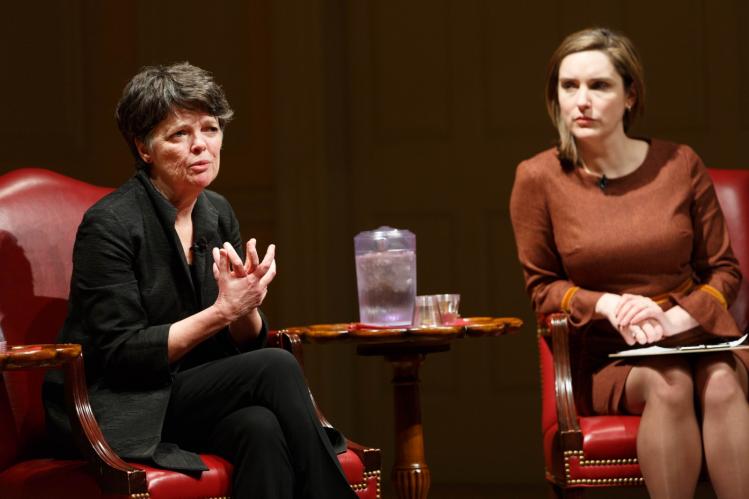
Early in Alice McDermott’s 2006 novel After This, a thirty-year-old unmarried woman named Mary Keane struggles with how to respond to some gossip shared by her officemate, Pauline. On the one hand, Mary doesn’t want to take delight in the humiliation of others, fearing that to make a habit of doing so will eventually make her “a part of the whispering spinster chorus at the edge of other, more interesting lives.” Tread carefully, Pauline’s character seems to suggest: act like an emotional vampire and you’ll become one.
On the other hand, Pauline makes office life more manageable for Mary—gossip can be fun. More seriously, there’s “the moral dilemma Pauline embodied.” With a sick mother, an estranged brother, and a generally cramped life, she is an unhappy woman. Is committing the minor sin of gossip worse than denying pleasure to someone whose life is so empty of it? Mary isn’t sure: “Feed my lambs, Jesus said. What was the cost of a little kindness toward someone who found her pleasure in being unkind? What was the good, as Sister Clare at school used to say, in loving only the lovable?”
Everything about this scene is typical McDermott, from the setting (New York in the years after World War II) to the clarity, and consequent power, of the language to the use of free indirect discourse to render the distinctive rhythms of interior experience. Few writers more accurately render how we actually think: the kinds of questions, moral and otherwise, we tend to ask ourselves; the kinds of voices, from the Gospel or childhood, that speak within us. And few writers have offered, over the course of their careers, such consistent excellence.
In several ways, McDermott’s latest novel, Absolution, is a departure. First off, it’s a Vietnam novel, not a New York City novel. Though most of the plot takes place in the 1960s, it is narrated from the present. (This is almost certainly the first time McDermott has used the term “mansplaining” in print.) It tells the story of Patricia Kelly, newly married and freshly transplanted to Saigon with her husband, Peter, an engineer for Esso. There she meets Charlene, the imperious and electric wife of another oil engineer. Charlene moves through the world with the “confidence of one born to wealth,” calling Patricia “Tricia” (“I had no idea how to correct her politely, so Tricia I became”) and enlisting others in her aim to “do good” for the local Vietnamese population. She’s continually hatching schemes, some defensible (selling Vietnamese-style Barbie outfits to Americans expats and using the profits to buy gifts for sick children), some not (getting involved in underground adoption so that local women can receive a cut). Patricia, a quiet girl from Yonkers whose greatest desire is “to be a helpmeet” to Peter, soon finds herself part of Charlene’s “cabal,” befriended and used in equal measure.
Most of Absolution consists of a series of letters a much older Patricia, back in the United States in a nursing home, sends to Rainey, Charlene’s daughter. (In one brief section, Rainey writes back.) The retrospective structure allows for temporal and moral complexity. Memory becomes an attempt to clarify and excavate, to understand if not forgive oneself and others. “I suppose all this—this saga or whatever it is—is my way of making amends,” Patricia says. Realism is still McDermott’s dominant mode, as it has been in her eight previous novels. At one point, Patricia imagines what her widowed father will do while she’s away: “He’ll iron a shirt every morning just to walk down the driveway to get the newspaper … He’ll say ‘pardon’ if he burps, even with no one there.”: a character, an entire world, captured in passing.
Yet in Absolution realism occasionally opens up into something stranger. An American doctor in Vietnam—pungent, sexy, overwhelmingly carnal—may or may not be the Devil. There’s one set of twins, then another, then another. At a hospital, Patricia sees children with horrible burns and “wonder[s] briefly if they were indications of some terrible ritual I didn’t understand.” (Years later, she’ll think of napalm.) Charlene has night terrors: “Something like what the newly blind must feel. Or the newly buried … And yet there was also this tremendous certainty on her part that something truly worthy of her fear, something as solid as it was horrific, was there, in this darkness.” Here and elsewhere, Chekhovian quiet flashes into Dostoevskian wildness.
After This wondered what good it was to only love the lovable. Absolution asks what good it is to love the seemingly unlovable: the dark, the disfigured, the suffering, the doomed. This isn’t merely a rhetorical question. “We’re capable of turning away,” Charlene says. “We’re capable of despising the sight of something so awful, something so incongruous to the good order we prefer.” Charlene doesn’t turn away and her refusal dramatizes the novel’s moral dilemma. What does it mean to do good? How can we know if we’re doing it for the sake of the suffering or for the sake of ourselves—to assert our will or prove our saintliness or just “shout back at the gobbling whirlwind”? When do altruism and the desire for absolution become a kind of selfishness?
These questions resonate with America’s history in Vietnam, and Absolution is a war novel of sorts, though it focuses on the wives of businessmen contracted by the military—the periphery of the war’s periphery. The book’s action mainly takes place in Saigon in 1963. Ngo Dinh Diem and John Kennedy are still Presidents. The Gulf of Tonkin incident hasn’t happened. As Patricia puts it, “In those days, the war, Vietnam itself, was nothing at all like it would become.”
Of course, Vietnam was something like what it would become. Patricia is there because her husband Peter has been hired as a “civilian advisor” for navy intelligence. (“It was much later still, decades later,” she writes, “that I suddenly wondered, laughing to think about it, why so many engineers were needed.”) American might and its authorizing ideologies are everywhere. Patricia goes to cocktail parties with military officers and their wives. She listens to Peter’s thoughts on the fight against Communism: Diem is Catholic, Kennedy is Catholic, Patricia and Peter are Catholic, and so, to Peter, the “shoring up [of] the Diem regime … seemed to portend the redemption he so believed in then.” Patricia hears about massacres in the jungle and worries over Viet Cong attacks. This is the backdrop against which Charlene’s schemes, and Patricia’s life, unfold.
As always, McDermott writes powerfully about the body and the demands it makes upon us. In one scene, Patricia visits a local hospital for the first time and encounters a burned, screaming young girl:
I held her. In those few minutes she became—it must sound strange to say—wholly physical for me, a body, human, distinct, whereas, I think, until just a moment before she was in her misery a problem to be solved, a child in pain, yes, but also a wailing to be stilled, a sound to be soothed or smothered, something pathetic but wholly other.
In another, Patricia, who longs to be a mother, has her first of several miscarriages. Charlene, ordinarily so domineering, becomes gentle, even pastoral:
Charlene placed the towel on her lap, over the gorgeous green silk, and unwrapped the little thing, barely distinguishable now against the blood-soaked cloth. We looked at it together, silently, for what seemed a long while. I was aware of the click of the fan above our heads, the encroaching heat, some distant sound of traffic and voices in the street, Charlene’s flesh against my own. The joss stick had nearly burned down, but the scent of it was certainly on the air.
And I suppose it was this scent that made me aware of both how far from home I was, how strange and exotic this place was, and yet how confined and familiar everything now felt, as if, with my own small failure, my own small grief, the world had shrunk, distance had lost its meaning. Nothing was foreign. No one was a stranger.
I mean, here was Charlene, beside me in my own bedroom, my cheek to her bare arm.
Gently, she placed the towel in my hands. She reached for the half bottle of Vichy water on my bedside table and poured a drop into her palm. She wet the fingertips of her right hand and made the sign of the cross over the tiny thing. Softly, she said, “I baptize thee, in the name of the Father, and of the Son, and of the Holy Ghost.”
To recognize the damaged body of another is to feel claimed or called. That doesn’t mean we know what to do with this call. Sometimes our efforts to ease suffering only exacerbate it. Sometimes we act less to love others than to absolve ourselves. Still, in Absolution as in everything McDermott has written, flesh matters. Touch matters. The body is, finally, holy.
Absolution
Alice McDermott
Farrar, Strauss and Giroux, $28, 336 pp.
Please email comments to [email protected] and join the conversation on our Facebook page.
Share
Previous Story
Pilgrimage to Villa Guadalupe
Next Story
An Anatomy Lesson


